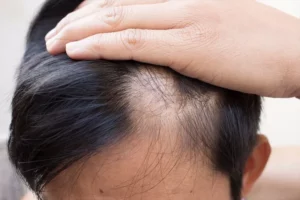We do not request reimbursement of costs
(such as repayment for obtaining medical records)
from veterans nor from people who suffer from multiple sclerosis.
- Call today for a free evaluation
- 1-888-774-7243
Is Alopecia A Disability?
Alopecia is a condition that causes hair loss and it can have a profound impact on a person’s life. Many individuals with alopecia wonder if they can claim disability benefits. The severity of those impacts can make extreme cases of alopecia be deemed a disability.
Here we’ll explore the nature of alopecia, its effects on individuals, and how and when it is considered a disability.
What is Alopecia?
Alopecia is a medical condition characterized by the loss of hair on the scalp or other parts of the body. There are several types of alopecia, including alopecia areata, scarring alopecia, and alopecia totalis, each with its own unique characteristics and patterns of hair loss. While the exact cause of alopecia is not fully understood, it is believed to be an autoimmune disorder in which the immune system mistakenly attacks hair follicles, leading to hair loss.
How Does Alopecia Affect a Person’s Life?
Alopecia can have a significant impact on a person’s emotional well-being and self-esteem. Hair loss is often associated with cultural norms and standards of beauty, and individuals with alopecia may experience feelings of self-consciousness, social anxiety, and depression.
The sudden and unpredictable nature of hair loss can also lead to difficulties in adapting to changes in appearance and managing the emotional toll it takes. Depending on a person’s lifestyle and preferences, they may also encounter additional costs for hair and scalp care, coverage such as wigs or hats for certain social environments, or medical costs associated with diagnosis or treatment depending on their prognosis.
Can a Person with Alopecia Qualify for Disability Benefits?
Whether a person with alopecia can qualify for disability benefits depends on several factors, including the severity of their condition and the specific disability criteria established by the governing bodies. In the United States, the Social Security Administration (SSA) oversees the process of determining disability eligibility. To qualify for disability benefits, the condition must meet the SSA’s definition of a disability, which includes the requirement of a severe impairment that prevents an individual from engaging in substantial gainful activity.
While alopecia itself may not automatically qualify as a disability, individuals with severe and extensive hair loss may be able to qualify for disability benefits if they can demonstrate that their condition significantly impacts their ability to work and earn a living.
What are the Common Symptoms of Alopecia?
The primary symptom of alopecia is hair loss, but this can happen on a ranging scale of small, moderate or total loss.
- In the case of alopecia areata, hair loss occurs in small, round patches.
- In more severe cases, it can progress to alopecia totalis, resulting in the loss of all scalp hair.
- Scarring alopecia, on the other hand, involves permanent hair loss due to inflammation and scarring of the hair follicles. Other symptoms may include:
- Itching
- Redness
- Burning sensations in the affected areas.
Is Alopecia a Permanent Condition?
Alopecia can vary in its course and severity. In some cases, hair regrowth may occur naturally, while in others, the condition may persist or worsen over time. It is important to note that alopecia is considered a chronic condition, meaning it can be long-lasting or recurrent even if it ceased for some time.
The unpredictable nature of hair loss and the potential for its impact on a person’s self-image and quality of life necessitate appropriate medical treatment and emotional support from qualified professionals.
Medical Treatment and Support:
While there is currently no known cure for alopecia, various treatment options are available to manage the condition and promote hair regrowth. These may include medications, such as corticosteroids or immunosuppressants, topical treatments, such as minoxidil, and other interventions, like hair transplantation.
Additionally, counseling and support groups can provide individuals with alopecia the emotional support and coping strategies they need to navigate the challenges associated with their condition.
Alopecia can significantly affect an individual’s life, both emotionally and socially. While the question of whether alopecia is considered a disability is complex and depends on various factors affecting each unique case, individuals with severe and extensive hair loss may be eligible for disability benefits.
Regardless of disability status, individuals with alopecia should seek appropriate medical treatment and emotional support to manage their condition effectively, prevent worsening of the condition where possible, and enhance their quality of life.
Seeking Legal help? Contact Disability Law Firm
If you believe that your alopecia has a significant impact on your ability to work, you may be eligible for disability benefits. You can file a claim for disability benefits.
Contact a qualified social security disability attorney for a consultation, such as Chermol & Fishman, LLC to help determine eligibility and navigate the application process.
For a Free Evaluation
Monday : 9am–5pm
Tuesday : 9am–5pm
Wednesday : 9am–5pm
Thursday : 9am–5pm
Friday : 9am–5pm
Saturday : Closed
Sunday :Closed

